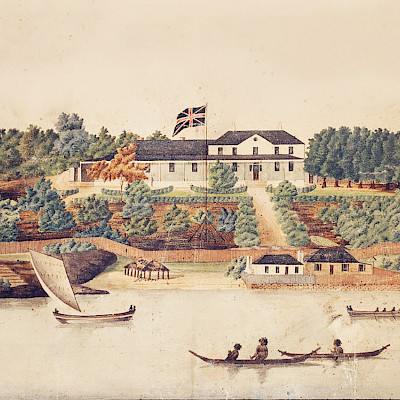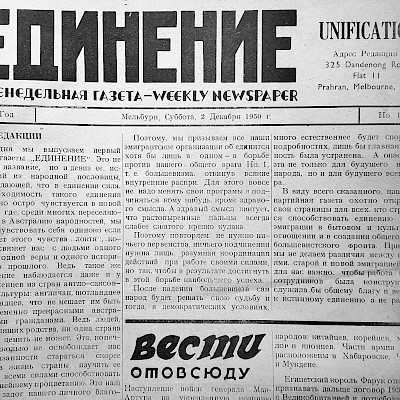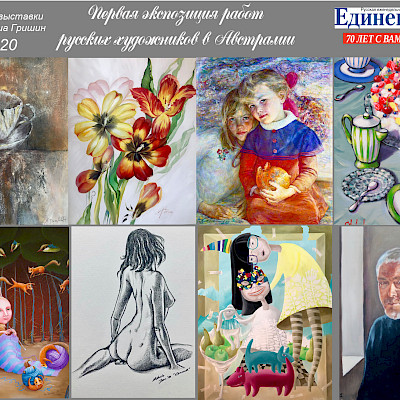Many of our older readers remember the times when Wladislaw Pulkownik's confectionery and bakery in Paddington was very popular in Sydney. Here one could buy some of the best chocolates in town.
They were also sold at the posh David Jones department store and stores in other Australian capital cities. The newspapers wrote that sometimes the chic Rolls Roys of the wife of the owner of the department store Lloyd Jones stopped at the modest Pulkownik store at 8 Elizabeth St Paddington, and the First ladies - wives of the Prime Ministers of the country, Frazer and Whitlam, used to come into the store with friends.
And the daughter of Wladyslaw (Walter), Lyudmilla or Lyula, as her old acquaintances call her, told us the story of her family. She was born in Australia and helped her father run the business for many years.
The history of the family confectionery business is rooted in Harbin, where Ludmilla's grandfather, Ivan Pulkownik, who had Polish roots, opened his family confectionery. Everyone who lived in Harbin in those pre-war times remembers his cakes and chocolates "Poceluy Negra". His wife was an accountant. The family had six children. Wladyslaw helped his father in Harbin, learned how to bake bread, make cakes and chocolates. In 1931 he married a Russian girl, Lyudmila Sitnikova.
Dad died soon after, and the Japanese brought their troops into Manchuria. Life has changed. They began to think about going overseas in search of a quiet life. Two daughters and mother went to America. Wladyslaw continued his father's work in distant Australia. He went to Australia "on exploration" while his wife remained in Harbin. He didn't like the country very much. He wrote to his wife about this, but received an answer: “The Japanese entered Harbin, life is more difficult every day. I sold everything. We have to leave. "
So, in 1939, the family gathered in Sydney. Several of their friends also arrived at the same time, most of them bought farms - chicken, dairy. “The places where these farms used to be are now Sydney suburbs. The Shershoffs had a farm in West Ryde, Stohursky and Drach in Seven Hill. My parents and the Schegolevs lived in a town near Paddington. At first, my mother and her girlfriends got jobs in Repin's cafes, famous at that time in Sydney, ”says Lyudmilla.
A small but friendly Russian community already lived in the city at that time. The St. Vladimir parish was created, which held services in the Russian club, at the priest's house or in rented premises, until the building in Centennial Park was bought. Wladislaw's wife was actively involved in the life of the sisterhood. “Mама helped Archimandrite Methodius, and dad baked Easter cakes. Mama took part in concerts in the Russian club, helped to arrange balls, children's Christmas trees and made friends there with the Davidenkov family, with whom friendship lasted for many years. My parents were sponsors for many Russian families who wanted to come to the country. Mama often went to Canberra, to get permission for families from Harbin to come, ”Lyudmilla continues.
Having settled in Sydney, Wladyslaw decided to establish the production of chocolate. Unfortunately, during the war, the supply of cocoa stopped, and they had to switch to the production of bread and pastries. Things went well at first. During this period, more than 30 workers worked in his factory. Many of the workers were newly arrived immigrants from Harbin. Wladyslaw, together with Yuri Davidenkov, helped to register those wishing to move to live on the fifth continent. Daughter Lyudmilla recalls that some new immigrants always lived in their house until they found permanent housing for themselves. She well remembers how in 1953 the family of the priest Rostislav Gan lived with his wife and three sons. Especially memorable was the youngest son Nikolai, who was closer to her in age. Father Rostislav was appointed rector of the Intercession community, and soon a new church began to be built in Cabramatta. Mom's uncle, Nikolai Malyavkin, also lived with them for a short time after arriving in Australia. He performed in Sydney on stage with the troupe of Vasily Tomsky and later was himself a director and staged performances in a musical and theatrical troupe.
In the early 1960s, the company's growth led to financial difficulties. His business had to be closed, and Wladyslaw began to work in his specialty for another company. When he finished work, he could not stay idle. His Harbin friends remembered his father's unforgettable chocolate with rum, and Wladyslaw returned to the family business. Unlike the chocolate sold in Australia in boxes, Pulkownik's chocolates were handmade and individually wrapped in bright, shiny wrappers. “By the way, there was a story with these wrappers,” says daughter Lyudmilla. “Sometimes schoolchildren came to the store and asked if there was any work for them. Dad always tried to help and paid well. The guys received 25 cents per kilogram. The guys were happy, in a couple of hours they could get a couple of dollars. My father believed that it is better to let them work here than to bully on the street, especially since he did it only with the permission of his parents. " A 14-year-old teenager told reporters that Wladyslaw or Walter, as he was called, is a wonderful person, and “we worked exactly as much as we wanted.” I also remember how one boy arrived proud, on a bicycle, and said that he bought it with the money he earned from his father. " Nevertheless, this did not go unnoticed by the authorities, and in 1977 Wladyslaw Ivanovich Pulkownik was fined $ 800 "for using child labor."
Starting a business is never easy. “The first time Dad offered his chocolates to the store in Double Bay, the owners said, 'Well, we don't know, leave a few bags.' It was on Friday, and on Monday they called and asked to bring another 10 kilograms. It was based on his father's recipe, a firm rum cream with a chocolate coating. My husband was a Dane, they had marzipan candies in their homeland, and he asked my father if he could make them. In Australia, then marzipan was not yet known. Dad made and named the candy "Natasha" after our daughter. When Igor was born, dad made Cherry Brandy. Then came Crème de Menthe, Romashka and even Prince Igor. Papa didn’t speak English very well, so he kept the doors of the store closed with the words "Ring" written on them. Nevertheless, Pulkownikov's sweets were a success. And in the shop windows there were several old Russian samovars”.
Opposite Pulkovnik's shop there were two houses, where in the early 60s almost all apartments were rented by Russians who came from Harbin. Natalia Melnikova told me that all the children who lived there were very fond of this wonderful store and its owner, and of course, they kept asking their parents to buy sweets. And when Easter was approaching, a charming smell of Easter cakes escaped from this store, even Australians wondered why this street suddenly smells so delicious. And the hospitable, witty and generous host received Russian friends, and with the sound of filled glasses, sincere conversations flowed.
Daughter Lyudmilla recalls what a fabulous cake dad made for her wedding day.
“At that time, there was not such a variety, from the delicacies there were only English meat pies and cream buns. And dad made beautiful cakes. For my wedding, he created a beautiful tall cake that surprised journalists and even got on the pages of a Sydney newspaper along with our happy faces. Things are different now, of course. People came to Australia from all over the world and the choice in everything, and in confectionery, is huge. "
Lyudmilla was born in Australia, but says she does not consider herself only Australian. “Before school, we spoke Russian at home. Mama and papa sometimes switched to Polish when they didn't want us to understand them, well, but we learned a little. When I graduated from school, I learned to be a nurse.
I left for London, worked there for two years, and then returned. I lived with my Dane husband for many years, so the Danish language is a little familiar. But it’s not me I would like to talk about. I would like to tell the story of my parents, how they came to Australia with absolutely nothing, worked hard, were not afraid to start their own business. For many years they did not go anywhere for holidays. We, the children, decided that it was unfair, and at the end of their lives they went on a trip for several months to visit their relatives - to America, Poland.
Wladyslaw Pulkownik until the end of his life, and he died in 1987 at the age of 77, continued to make chocolates. The youngest son tried to continue the business, but his business did not go well. So there is nowhere else to buy Pulkownik's chocolates, everything remains in the history and memory of the old generation of Russians who lived in Harbin and Sydney in the 20th century.
Vladimir KOUZMIN































